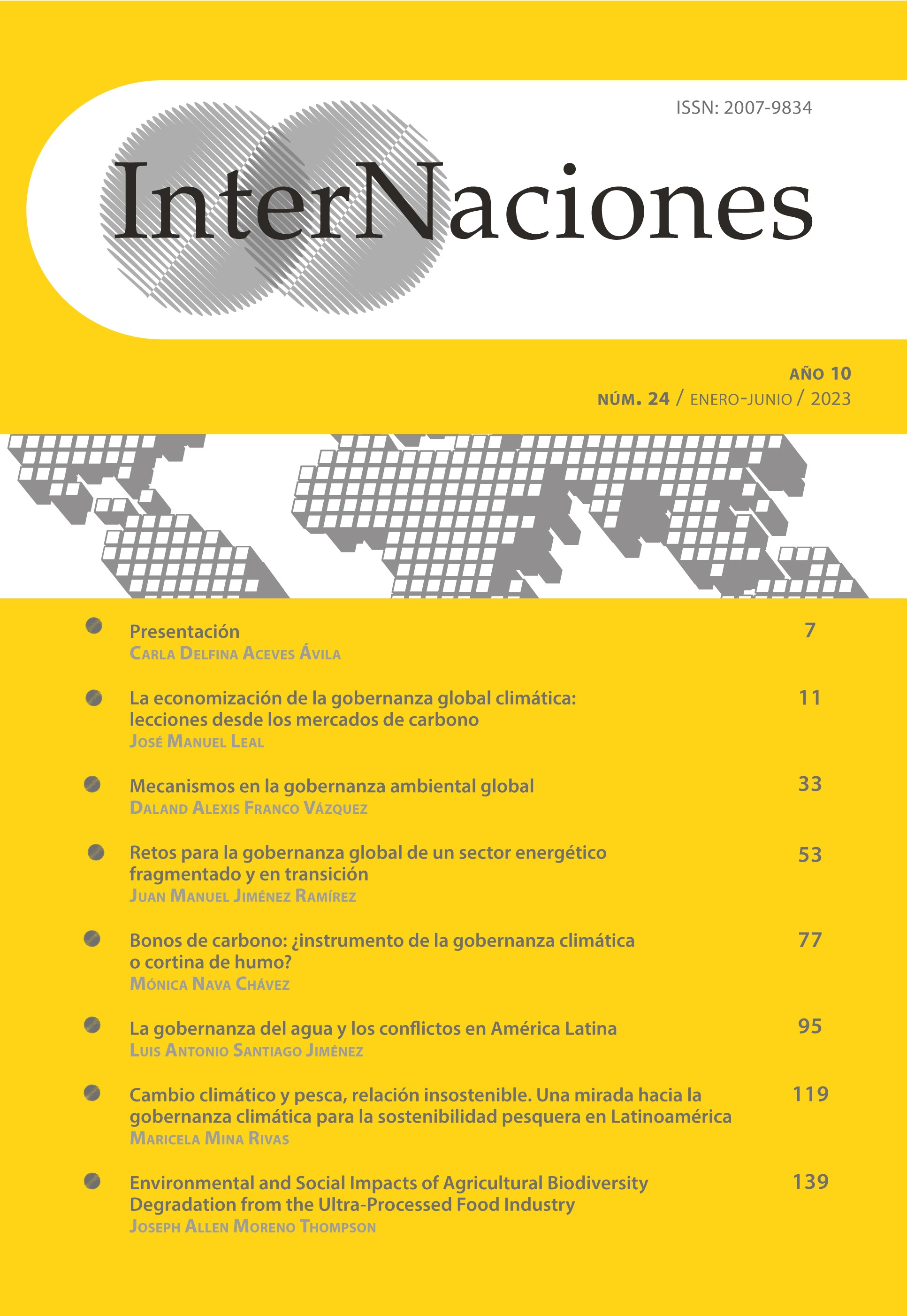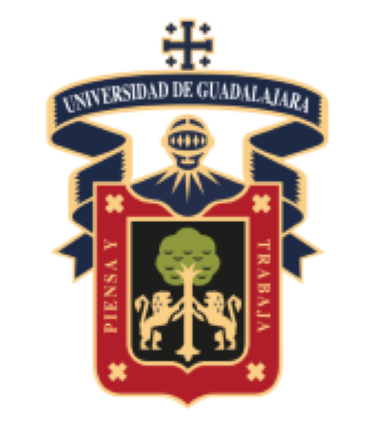Impactos ambientales y sociales de la degradación de la biodiversidad agrícola por la industria de alimentos ultraprocesados
DOI:
https://doi.org/10.32870/in.vi24.7235Palabras clave:
Agrobiodiversidad, degradación de suelos, monocultivos, Industria "Big Food", política alimentaria, alimentos ultra procesados y saludResumen
Este artículo analiza los impactos ambientales y sociales causados por la degradación de la biodiversidad agrícola por las prácticas de “Big Food” y la agroindustria asociada a los alimentos ultra procesados. La degradación de Biodiversidad agrícola con la perdida de la fertilidad del suelo, la contaminación marina y la emisión de gases de efecto invernadero son consecuencia directa de la expansión de la agroindustria. Pretende brindar un análisis integral que muestre cómo cada parte del ecosistema se ve afectada negativamente junto con la salud humana; a través de prácticas de monocultivo, financiarización de los sistemas alimentarios y uso intensivo de fertilizantes y pesticidas. Da un vistazo al papel que juegan los gobiernos y actores en la formulación de políticas internacionales al ser un factor determinante del poder para la difusión de los alimentos ultra procesados y el crecimiento de "Big Food", las agro-corporaciones y los monocultivos. Analiza factores sociales como la salud, la política agroindustrial y las agendas alimentarias mundiales en relación con el medio ambiente y nuestro sistema alimentario.Descargas
Citas
Cann, V., Hoedeman, O., Scharen, H. V., Bernard, A., Christensen, H., & Quijano, I.-I. (n/d). Edited by Katharine Ainger, No. 33.
Clapp, J., & Isakson, S. R. (2018). Speculative Harvests: Financialization, Food, and Agriculture. https://doi.org/10.3362/9781780449920
Claydon, S. (n/d). Pesticides in our Environment. Pesticide Action Network uk. Retrieved March 30, 2022, from https://www.pan-uk.org/our-environment/
Definition of Agriculture. (n/d). Retrieved April 25, 2022, from https://www.merriam-webster.com/dictionary/agriculture
El-Zein, A. (n/d). On dangerous ground: Land degradation is turning soils into deserts. The Conversation. Retrieved April 18, 2022, from http://theconversation.com/on-dangerous-ground-land-degradation-is-turningsoils-into-deserts-94100
Enhancing agricultural biodiversity. (n/d). [Text]. European Commission - European Commission. Retrieved April 18, 2022, from https://ec.europa.eu/info/food-farming-fisheries/sustainability/environmental-sustainability/biodiversity_en
globalreach.com, G. R. I. P., LLC-Ames, IA-. (n/d). The Importance of Biodiversity to Food and Agricultural Systems across the Globe. Retrieved April 18, 2022, from https://www.worldfoodprize.org/index.cfm/88533/18098/the_importance_of_biodiversity_to_food_and_agricultural_systems_across_the_globe
How Our Food System Affects Public Health. (n/d). FoodPrint. Retrieved April 25, 2022, from https://foodprint.org/issues/how-our-food-system-affects-public-health/
Kristof. (n/d). Food, the Source of Nutrition! | Never Ending Food. Retrieved April 11, 2022, from https://www.neverendingfood.org/food-thesource-of-nutrition/
Leite, F. H. M., Khandpur, N., Andrade, G. C., Anastasiou, K., Baker, P., Lawrence, M., & Monteiro, C. A. (2022). Ultra-processed foods should be central to global food systems dialogue and action on biodiversity. Bmj Global Health, 7(3): e008269. https://doi.org/10.1136/bmjgh-2021-008269
Monteiro, C. A., Cannon, G., Levy, R. B., Moubarac, J.-C., Louzada, M. L., Rauber, F., Khandpur, N., Cediel, G., Neri, D., Martinez-Steele, E., Baraldi, L. G., & Jaime, P. C. (2019). Ultra-processed foods: What they are and how to identify them. Public Health Nutrition, 22(5): 936-941. https://doi.org/10.1017/S1368980018003762
Monteiro, C. A., Cannon, G., Moubarac, J.-C., Levy, R. B., Louzada, M. L. C., & Jaime, P. C. (2018). The un Decade of Nutrition, the nova food classification and the trouble with ultra-processing. Public Health Nutrition, 21(1): 5-17.https://doi.org/10.1017/S1368980017000234
Perez-Escamilla, R. (2017). Food Security and the 2015-2030 Sustainable Development Goals: From Human to Planetary Health: Perspectives and Opinions. Current Developments in Nutrition, 1(7): e000513. https://doi.org/10.3945/cdn.117.000513
Seferidi, P., Scrinis, G., Huybrechts, I., Woods, J., Vineis, P., & Millett, C. (2020). The neglected environmental impacts of ultra-processed foods. The Lancet Planetary Health, 4(10): e437-e438. https://doi.org/10.1016/S2542-5196(20)30177-7
Soil degradation poses risk to food security. (n/d). Retrieved March 29, 2022, from https://www.aa.com.tr/en/environment/soil-degradation-posesrisk-to-food-security/1664531
Study shows EU Glyphosate assessment based on flawed science | Corporate Europe Observatory. (n/d). Retrieved April 12, 2022, from https://corporateeurope.org/en/2021/07/study-shows-eu-glyphosate-assessment-basedflawed-science
The Right to Food | Food and Agriculture Organization of the United Nations. (n/d). Retrieved April 13, 2022, from https://www.fao.org/right-tofood
What is Agro-biodiversity? (n/d). Retrieved April 25, 2022, from https://www.fao.org/3/y5609e/y5609e01.htm
Publicado
Cómo citar
Número
Sección
Licencia
Derechos de autor 2022 Universidad de Guadalajara

Esta obra está bajo una licencia internacional Creative Commons Atribución-NoComercial-CompartirIgual 4.0.
CC BY-NC-SA 4.0 https://creativecommons.org/licenses/by-nc-sa/4.0/



























